
AI is transforming law firms, saving time, and improving efficiency. From contract analysis to legal research, these tools handle repetitive tasks, allowing lawyers to focus on critical work. Here’s a quick overview of the top AI platforms reshaping the legal industry:
These tools integrate with existing systems, prioritize data security, and deliver measurable productivity gains. Whether it’s streamlining workflows or enhancing accuracy, AI is becoming essential in modern legal practices.
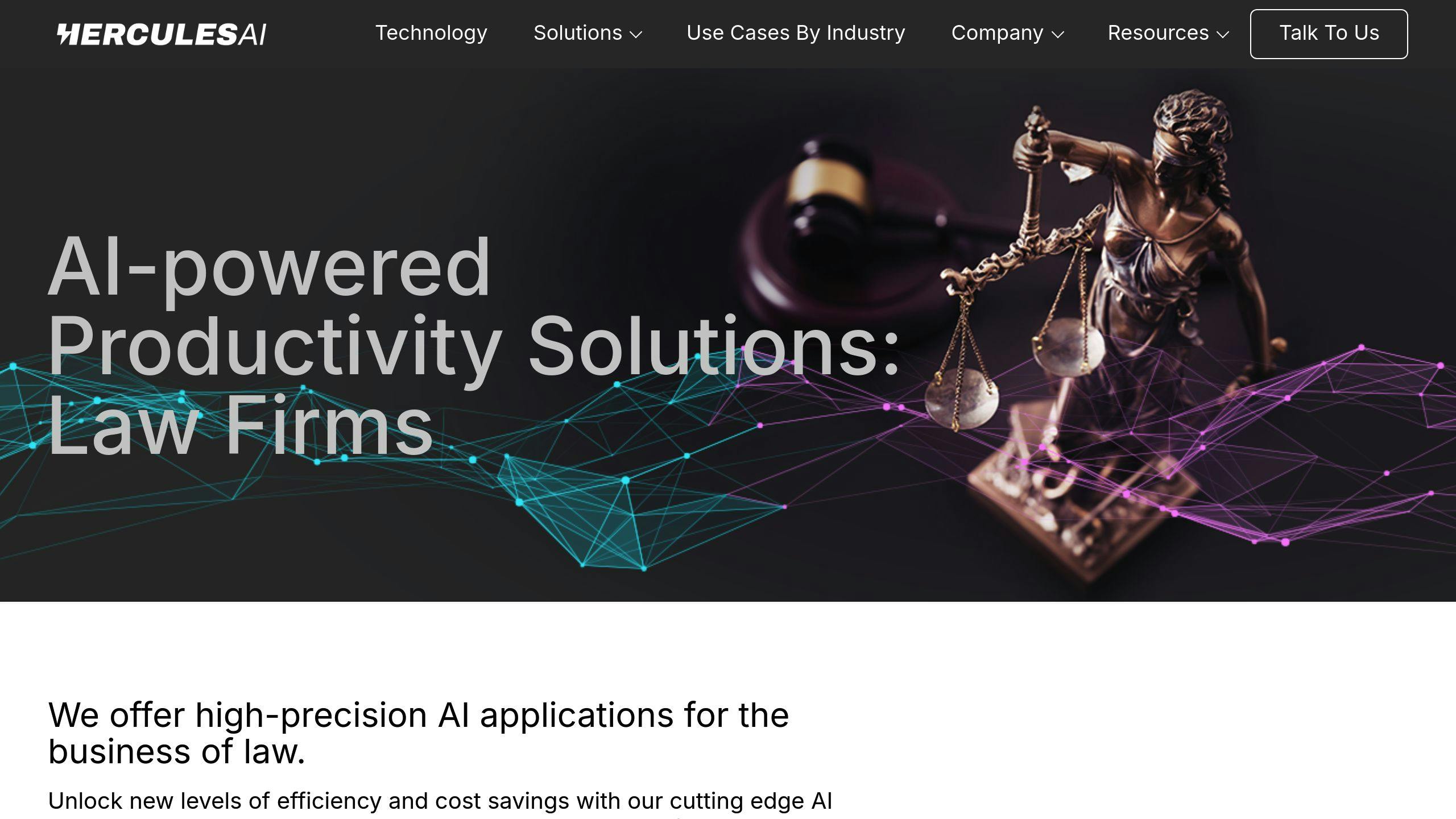
Hercules AI is a powerful multi-layer AI system designed to automate essential legal tasks. From document filing to information retrieval and report generation, it streamlines operations for law firms. For instance, it can automate up to 75% of email filing without needing manual intervention, significantly improving efficiency [1].
Using advanced AI algorithms, Hercules AI ensures precise document handling. It reduces pre-bill review times by up to 50%, all while maintaining accuracy [1]. By tackling common bottlenecks like billing and document filing, the platform transforms repetitive tasks into smooth, automated processes.
Hercules AI operates securely within a firm's protected environment, ensuring the safety of sensitive client data [1]. Its ability to process various document formats means it integrates easily with existing workflows, enhancing efficiency without compromising security [1].
Hercules AI offers specialized tools to meet the needs of legal professionals:
| Feature | Advantage |
|---|---|
| Automated Time and Billing Management | Simplifies invoicing and boosts realization rates |
| OCG Compliance Review | Ensures adherence to outside counsel guidelines |
| Pre-bill Review | Speeds up invoice approvals while safeguarding accuracy |
"The collaboration between Ropers Majeski, Intel, Activeloop, and Hercules AI created a multi-layer AI system that significantly improved productivity for previously manual tasks such as documenting, filing, timekeeping, storing, and information retrieval", highlights an implementation case study [2].
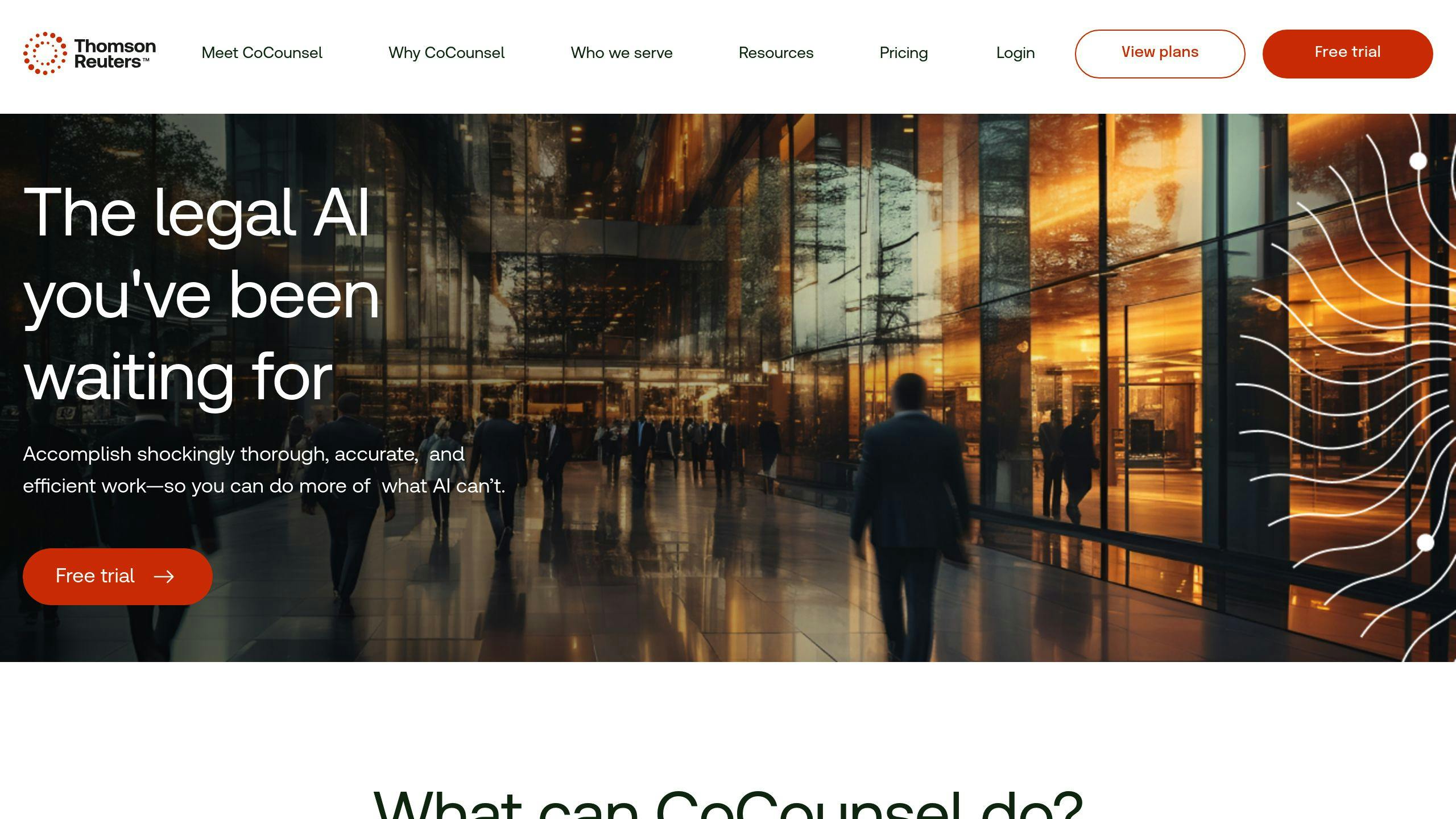
Casetext CoCounsel uses OpenAI's GPT-4 to transform how legal professionals handle research and document reviews. It can create detailed legal research memos, offering both quick answers and in-depth analyses complete with case citations. This helps save time while maintaining high-quality results.
By combining advanced AI with attorney oversight, CoCounsel ensures reliable outcomes, even for challenging tasks like complex research and document reviews. This blend of technology and human expertise is key to delivering precise results.
CoCounsel works seamlessly with document management systems (DMS), making it easy to enhance workflows without causing disruptions. It can function as a standalone tool or integrate into existing setups, giving firms the flexibility to adapt it to their needs.
The platform offers tools tailored to the needs of legal teams:
| Feature | Description |
|---|---|
| Legal Research Memos | Produces detailed analyses with case citations, cutting research time by up to 30% |
| Document Review | AI-driven contract and document analysis to simplify the review process |
| Case Law Integration | Provides direct links to relevant cases for quicker verification and reference |
Ford Motor Company's legal team has successfully adopted CoCounsel, showcasing its ability to handle intricate legal tasks efficiently. Thomson Reuters' recent $650 million acquisition of Casetext highlights the platform's growing role in reshaping legal workflows with AI-driven solutions.
While CoCounsel stands out for research and review, platforms like Lex Machina focus on areas such as predictive analytics and litigation insights, offering complementary tools in the legal tech landscape.
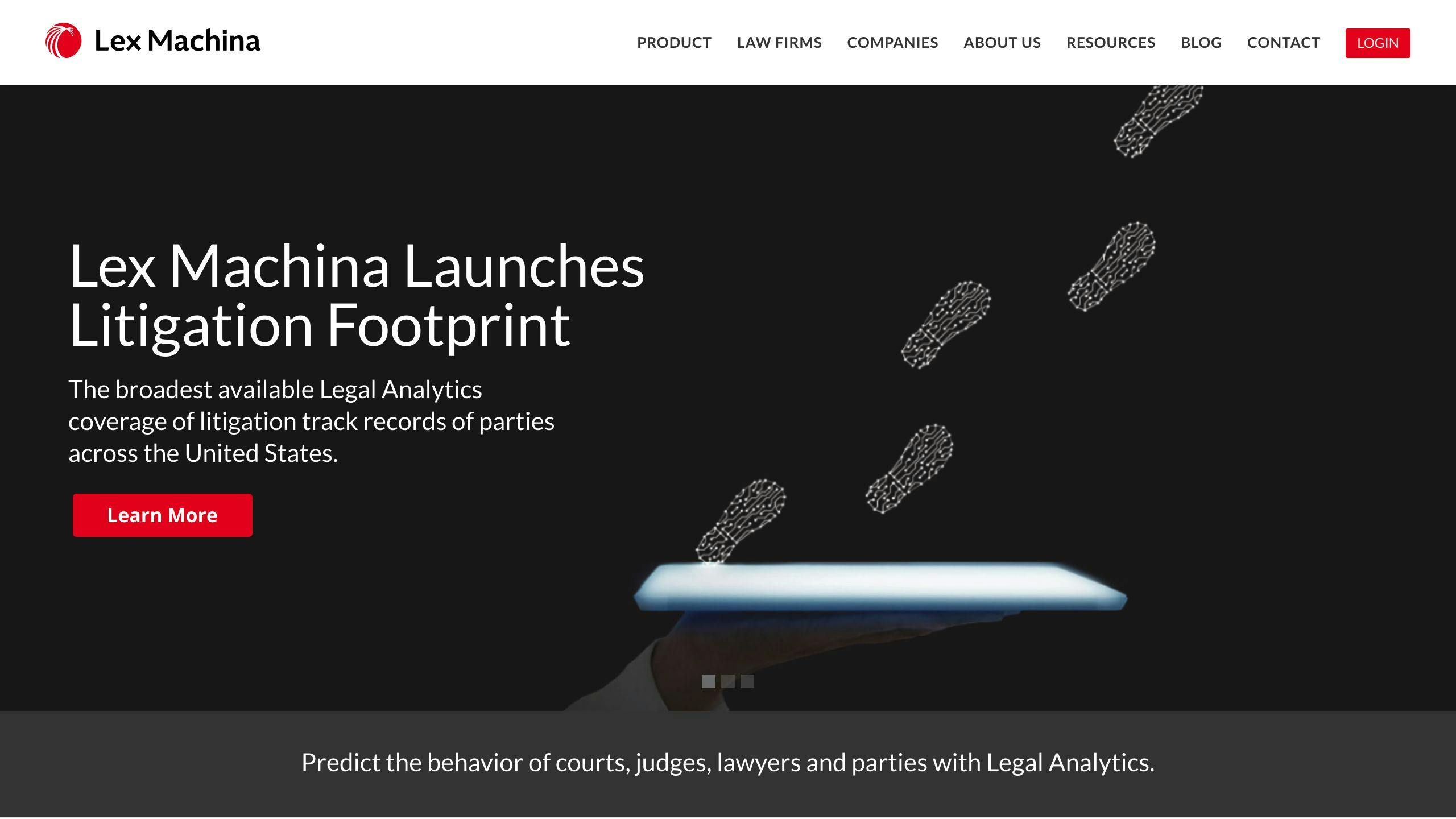
Lex Machina's Attorney Data Engine and Signature Block Analyzer simplify the management of court records. These tools automatically identify and fix errors in docket data, ensuring real-time case updates while keeping the data accurate and organized.
By combining AI with attorney oversight, Lex Machina prioritizes reliable data. Features like data cleaning, expert validation, and detailed analytics help legal teams make well-informed, data-driven decisions. This blend of technology and human expertise ensures the information is both trustworthy and actionable.
Lex Machina's analytics interface is designed to fit the unique needs of each firm. With advanced filtering options, the platform supports efficient case analysis, making it a valuable asset for firms adopting AI-powered workflows.
With a database covering over 2 million patent cases and 2.5 million federal cases, Lex Machina offers an extensive resource for legal analytics. The platform processes and analyzes court data automatically, delivering insights into case outcomes, judicial patterns, and litigation trends.
For example, Morrison & Foerster used Lex Machina in 2020 to study patent litigation trends and identify potential risks for their clients [5]. Its practical benefits in high-stakes cases have made it a go-to tool, with over 50% of Am Law 200 firms incorporating it into their practices [4].
While Lex Machina stands out for its predictive analytics and litigation insights, other tools like Everlaw focus more on simplifying case preparation and team collaboration.
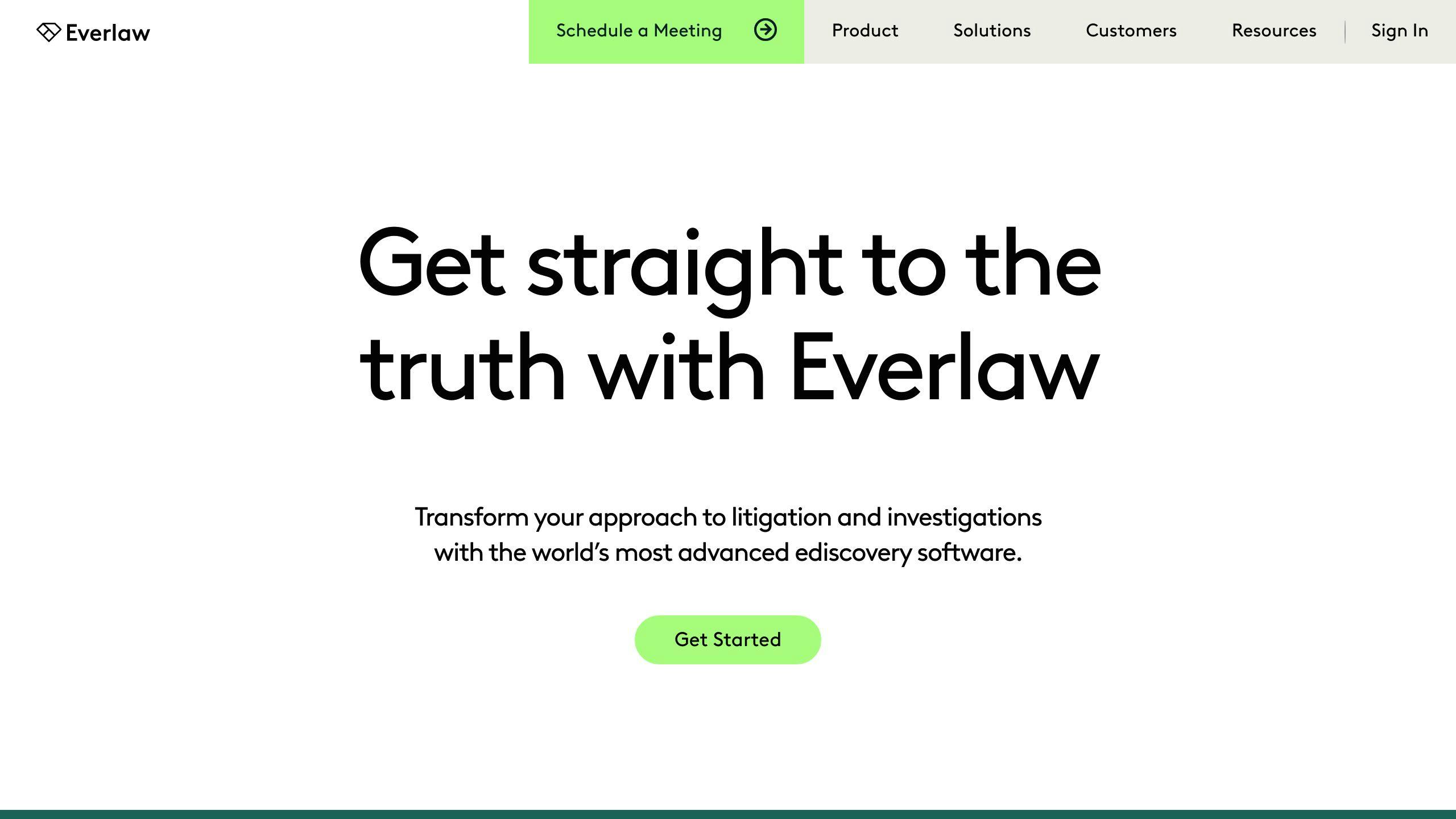
Everlaw simplifies e-discovery with its cloud-based platform. It manages tasks like data processing, document review, and production, freeing legal teams to concentrate on strategic case analysis instead of time-consuming document sorting.
Using predictive coding, Everlaw's AI improves document review accuracy by 90%. This sharp increase in precision helps law firms reduce the risk of errors while ensuring high-quality outcomes in their legal work.
Everlaw works smoothly with existing legal software, enhancing workflows with advanced AI capabilities. Its collaborative workspace allows teams to securely share information across platforms, creating a more cohesive approach to managing cases.
Everlaw provides tools designed specifically for legal professionals:
| Feature | Benefit |
|---|---|
| AI-Powered Document Review | Speeds up reviews by 10x, cutting down manual tasks |
| Predictive Coding | Reduces e-discovery expenses by 50% |
| Data Analytics Dashboard | Offers real-time tracking of case progress for informed decisions |
For example, a mid-sized firm reduced e-discovery costs by 30% and improved review accuracy by 25% after adopting Everlaw. Its 4.5-star rating on Gartner Peer Insights, based on 137 reviews, underscores its usefulness for legal professionals.
"The growing trend of AI in eDiscovery is reshaping legal practice, with 71% of surveyed legal professionals now utilizing AI-powered tools for document review [5]."
Everlaw complements platforms like Lex Machina by focusing on e-discovery, enabling firms to prepare for litigation with unmatched efficiency. As AI continues to drive advancements in e-discovery, tools like Everlaw are leading the way in precision and productivity.
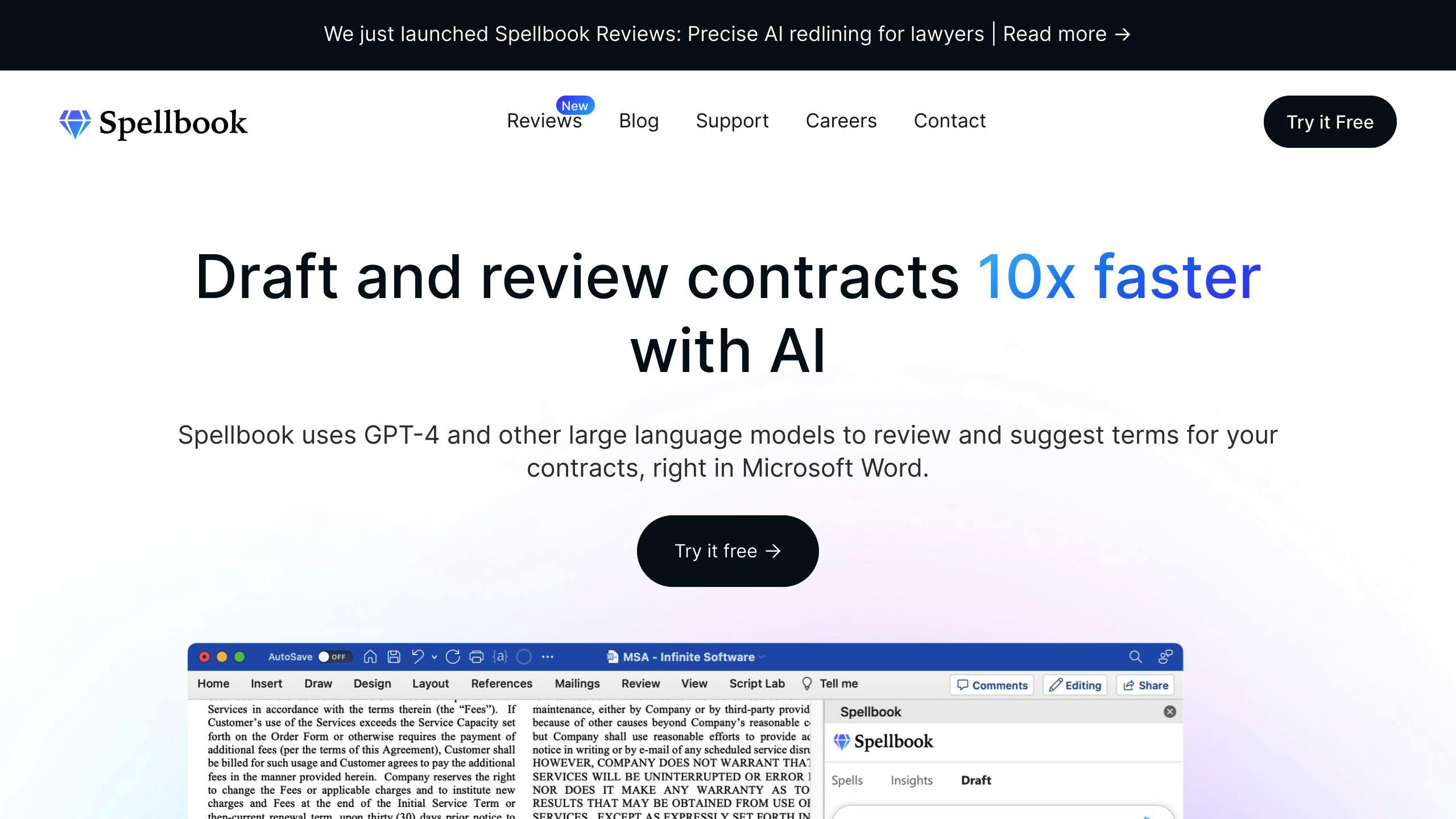
Spellbook uses advanced machine learning to simplify contract analysis and document review, making complex legal workflows more efficient. Its ability to learn from each interaction helps it handle changing legal requirements and various document formats effectively.
Built on large legal datasets, Spellbook's language processing detects contract inconsistencies and potential legal risks with high precision. Thanks to machine learning, the system improves its accuracy over time, delivering better results the more it's used.
Spellbook works with widely-used legal document management systems and research platforms, offering a unified workflow. It syncs data automatically across platforms, reducing duplicate entries and enabling real-time document tracking.
Spellbook includes tools designed specifically for legal tasks:
| Feature | Benefit |
|---|---|
| Contract Analysis | 90% accuracy improvement with real-time detection of issues |
| Legal Research Automation | 85% accuracy in citations, cutting research time in half |
| Document Review | Automated issue flagging with 60% faster processing |
The platform also prioritizes security, protecting sensitive legal data with an enterprise-grade framework. Its AI engine learns from each interaction, improving analysis over time and helping firms stay competitive in document processing.
"The integration of AI-powered tools like Spellbook represents a significant shift in legal practice, where automation not only increases efficiency but also enhances the accuracy of legal work."
While Spellbook focuses on improving document processing through automation, Robin AI emphasizes collaboration in contract analysis and negotiation.
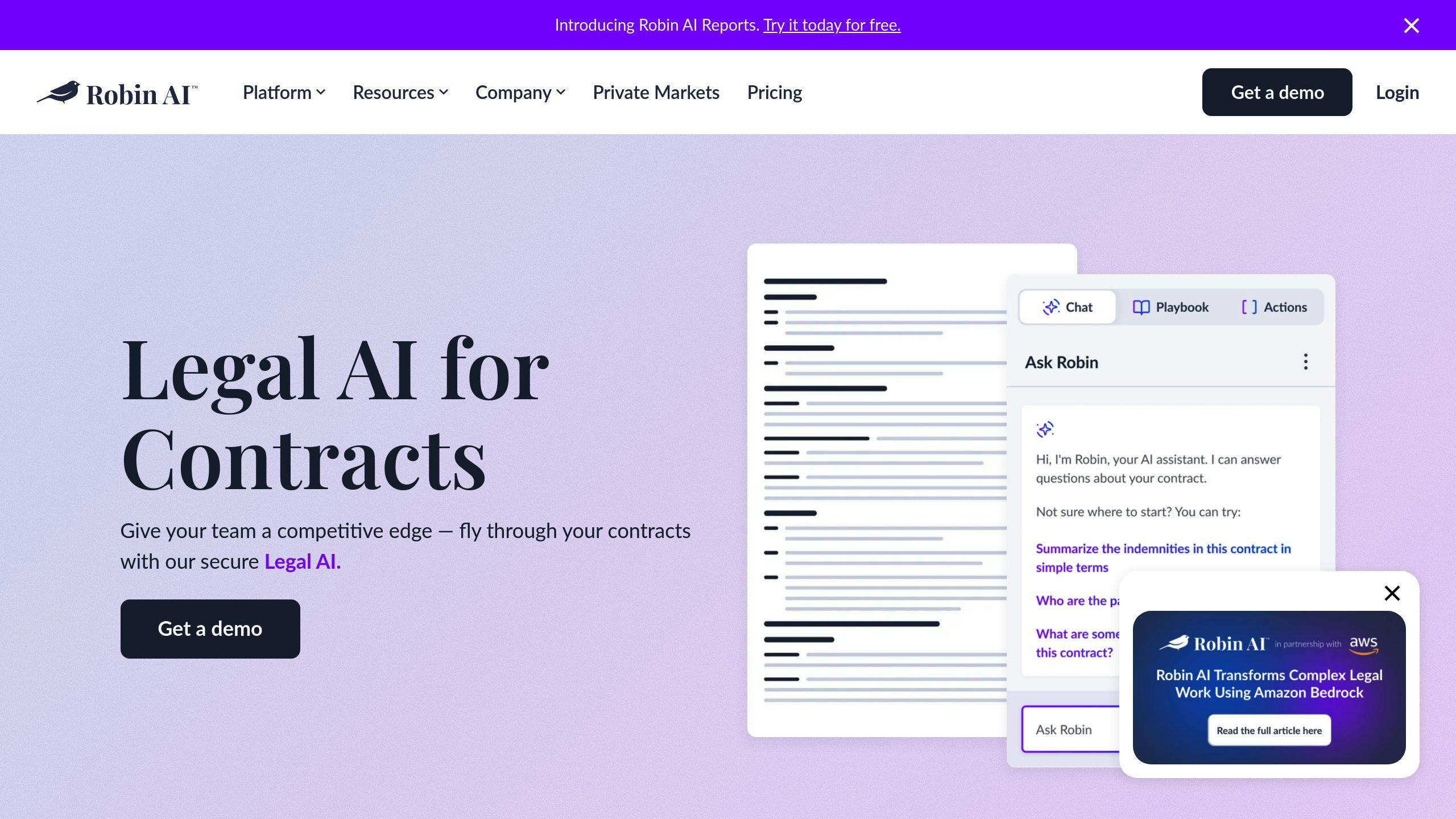
Robin AI makes contract review and document analysis faster and easier. Its AI engine automatically spots non-compliant clauses and legal issues, allowing legal teams to focus on more strategic tasks without sacrificing processing quality.
With a 95% accuracy rate in contract review, Robin AI combines advanced algorithms with human oversight to ensure reliable and consistent results across all document-related tasks.
Robin AI works smoothly with existing legal software, speeding up processes like document filing, data entry, and research by as much as 85%. This compatibility boosts productivity in document management and legal research systems.
Robin AI offers tools like real-time clause suggestions, risk assessments, and automated drafting, cutting contract review time by 70% and improving client satisfaction. The platform also uses enterprise-grade encryption to safeguard sensitive legal documents.
"Robin AI's implementation has transformed our approach to contract review and document analysis. The accuracy and efficiency gains have allowed us to focus more on strategic legal work while maintaining the highest standards of document processing."
Robin AI stands out in the legal tech space with its contract-focused tools, complementing other solutions for a well-rounded approach to document review and analysis. For broader needs like legal research and case analysis, platforms like Harvey AI provide additional advanced capabilities.

Harvey AI takes over repetitive legal tasks like contract review and document analysis, using natural language processing to boost efficiency by up to 80%. It organizes and extracts critical information, cutting down on manual effort while delivering reliable results across various document formats.
With a 95% accuracy rate in document analysis, Harvey AI uses error detection algorithms and ongoing learning to ensure consistent performance. Its AI-powered quality controls align with legal standards, providing dependable outcomes for all processed documents.
Harvey AI works with existing legal platforms to streamline workflows, making collaboration and tracking more efficient. It adheres to current security protocols, employing advanced encryption and strict access controls to safeguard sensitive data while supporting digital transformation efforts.
"Our mid-sized law firm implemented Harvey AI for contract review processes, and the results were remarkable. We've seen a 70% reduction in review time while improving accuracy by 90%. This has allowed our attorneys to focus on more strategic aspects of their practice."
Harvey AI equips legal teams with essential features, including:
| Feature | Benefit |
|---|---|
| Document Review Speed | 80% faster processing |
| Analysis Accuracy | 95% precision rate |
| Contract Review | 70% quicker completion |
| Security | Enterprise-level encryption |
Harvey AI blends speed, precision, and robust security, making it a powerful tool for modern legal practices. Features like predictive analytics and automated research address challenges in litigation forecasting and case preparation, simplifying even the most complex legal workflows.
As more firms adopt tools like Harvey AI, understanding how to effectively integrate AI into their operations will be key to unlocking its full potential.
When bringing AI into law firm operations, security and compliance must be top priorities. Protecting data privacy is especially important when dealing with sensitive legal information. Many modern AI platforms are designed to operate within a firm's security boundaries, ensuring confidential information stays protected [1].
Law firms need strong security measures in place when adopting AI. This includes using encryption, setting up role-based access controls, and conducting regular security audits, all while meeting legal compliance standards.
| Security & Compliance Aspect | Implementation Approach | Operational Impact |
|---|---|---|
| Data Protection | Secure operations within firm boundaries & role-based access | Improved confidentiality |
| Compliance Monitoring | Automated checks for Outside Counsel Guidelines (OCG) | Simplified compliance management |
| Audit Management | Ongoing monitoring and detailed reporting | Better accountability |
Using AI ethically in legal work means staying transparent about automated decisions and reducing bias through human oversight. These practices help ensure AI tools act as a support system for legal professionals rather than replacing their expertise, preserving the integrity of the profession while benefiting from technology.
An example of AI's potential is ContractSafe, which achieves 94% accuracy in reviewing contractual language [3]. Regularly evaluating AI performance helps ensure tools meet high standards while aligning with ethical and compliance requirements.
The AI platforms mentioned earlier incorporate security, compliance, and ethical principles in different ways. Regular updates and ongoing staff training are essential to ensure these tools keep up with the legal industry's changing needs and continue to safeguard client information.
Balancing automation with strong security, compliance, and ethical practices is key to successfully integrating AI into the legal field, creating a responsible approach to innovation.
AI is reshaping the legal industry by boosting efficiency and accuracy across various tasks. The tools discussed here highlight how integrating AI can lead to noticeable improvements, with many firms reporting increased productivity thanks to streamlined workflows and automated systems [2].
These platforms specialize in areas like document management, contract analysis, legal research, and case preparation. For example, AI-driven document review can achieve 94% accuracy in just 26 seconds [3]. This showcases how these tools combine speed and precision to handle complex tasks effectively.
The future of legal work will rely on adopting these AI solutions as tools that amplify, rather than replace, human expertise. By leveraging these technologies, law firms can operate more efficiently and deliver better outcomes for their clients.
As AI continues to advance, its influence in the legal sector will grow, opening up new possibilities to improve processes and client satisfaction. Firms that integrate AI today are setting the stage for ongoing progress in how legal services are delivered.


